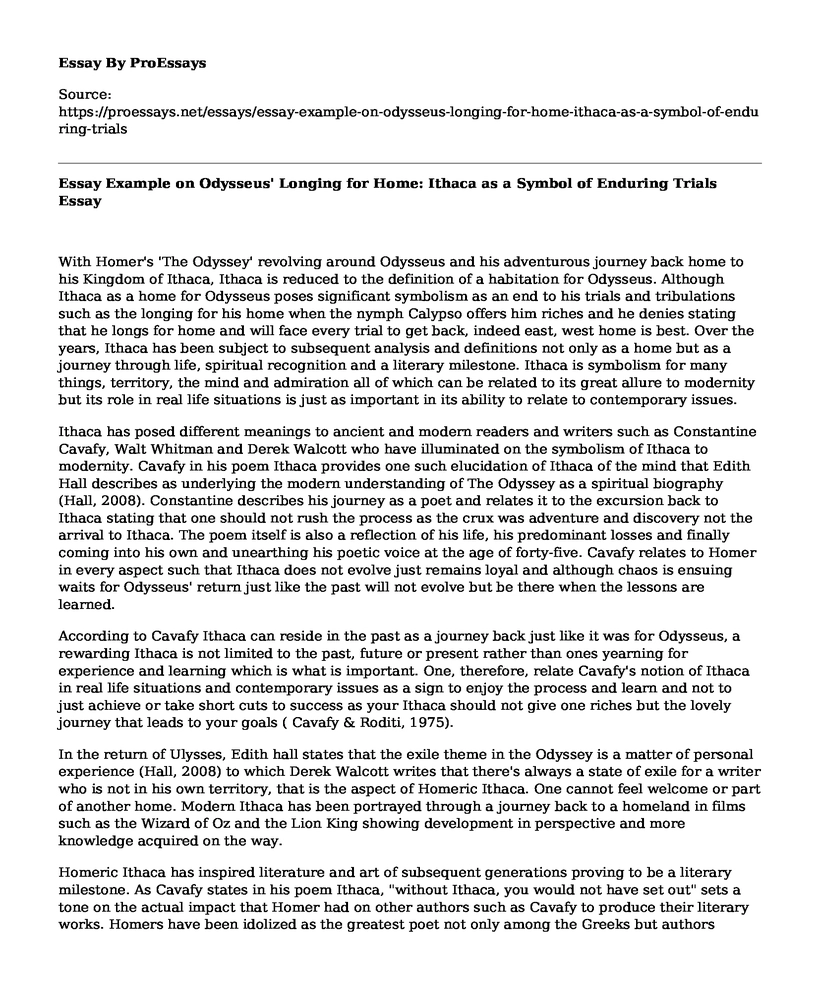With Homer's 'The Odyssey' revolving around Odysseus and his adventurous journey back home to his Kingdom of Ithaca, Ithaca is reduced to the definition of a habitation for Odysseus. Although Ithaca as a home for Odysseus poses significant symbolism as an end to his trials and tribulations such as the longing for his home when the nymph Calypso offers him riches and he denies stating that he longs for home and will face every trial to get back, indeed east, west home is best. Over the years, Ithaca has been subject to subsequent analysis and definitions not only as a home but as a journey through life, spiritual recognition and a literary milestone. Ithaca is symbolism for many things, territory, the mind and admiration all of which can be related to its great allure to modernity but its role in real life situations is just as important in its ability to relate to contemporary issues.
Ithaca has posed different meanings to ancient and modern readers and writers such as Constantine Cavafy, Walt Whitman and Derek Walcott who have illuminated on the symbolism of Ithaca to modernity. Cavafy in his poem Ithaca provides one such elucidation of Ithaca of the mind that Edith Hall describes as underlying the modern understanding of The Odyssey as a spiritual biography (Hall, 2008). Constantine describes his journey as a poet and relates it to the excursion back to Ithaca stating that one should not rush the process as the crux was adventure and discovery not the arrival to Ithaca. The poem itself is also a reflection of his life, his predominant losses and finally coming into his own and unearthing his poetic voice at the age of forty-five. Cavafy relates to Homer in every aspect such that Ithaca does not evolve just remains loyal and although chaos is ensuing waits for Odysseus' return just like the past will not evolve but be there when the lessons are learned.
According to Cavafy Ithaca can reside in the past as a journey back just like it was for Odysseus, a rewarding Ithaca is not limited to the past, future or present rather than ones yearning for experience and learning which is what is important. One, therefore, relate Cavafy's notion of Ithaca in real life situations and contemporary issues as a sign to enjoy the process and learn and not to just achieve or take short cuts to success as your Ithaca should not give one riches but the lovely journey that leads to your goals ( Cavafy & Roditi, 1975).
In the return of Ulysses, Edith hall states that the exile theme in the Odyssey is a matter of personal experience (Hall, 2008) to which Derek Walcott writes that there's always a state of exile for a writer who is not in his own territory, that is the aspect of Homeric Ithaca. One cannot feel welcome or part of another home. Modern Ithaca has been portrayed through a journey back to a homeland in films such as the Wizard of Oz and the Lion King showing development in perspective and more knowledge acquired on the way.
Homeric Ithaca has inspired literature and art of subsequent generations proving to be a literary milestone. As Cavafy states in his poem Ithaca, "without Ithaca, you would not have set out" sets a tone on the actual impact that Homer had on other authors such as Cavafy to produce their literary works. Homers have been idolized as the greatest poet not only among the Greeks but authors around the world having fed on Homer, learned from him or admired him and his work labeled as unparalleled. Homer is, therefore, their Ithaca, the one who gave them their beautiful journey who led to an increase in their yearning for knowledge and Ithaca. The Ithaca of admiration in modernity can be classified as a person or experience that leads to the journey that inaugurates one's hopes and dreams.
The role of Ithaca has given meaning to many authors and filmmakers over the years presenting an allure to modernity that relates to real life situations showing impact as not only habitation for Odysseus but a state of mind, an admiration the end of a journey that has to be won with a fight.
References
Cavafy, C., & Roditi, E. (1975). Ithaca. Chicago Review, 27(3), 33-33.
Finley, J. H. (1978). Homer's Odyssey (p. 62). Cambridge: Harvard University Press.
Hall, E. (2008). The Return of Ulysses: A Cultural History of Homer's Odyssey. IB Tauris. Retrieved from https://hcommons.org/deposits/download/hc:10640/CONTENT/return-of-ulysses.pdf/
Cite this page
Essay Example on Odysseus' Longing for Home: Ithaca as a Symbol of Enduring Trials. (2023, Jan 23). Retrieved from https://proessays.net/essays/essay-example-on-odysseus-longing-for-home-ithaca-as-a-symbol-of-enduring-trials
If you are the original author of this essay and no longer wish to have it published on the ProEssays website, please click below to request its removal:
- Comparison Essay Sample on Cinderella Folk Story and Hamlet
- Literary Analysis Essay on Richard Cory
- Essay Sample on Anne Sexton's Cinderella: A Twist on a Classic Tale
- Analysis of Sophocles' Antigone Essay Example
- The Theme of Family and Class in "The Bluest Eye" and "The Great Gatsby": Compare and Contrast Essay
- Essay Example on The American Dream: Success Through Hard Work and Sacrifice
- Essay Example on Humor: Transgression of Taboos & Surprising Deviations







